How Brisbane pulled off the impossible to secure 2032 Olympics
The news that Brisbane will host the 2032 Olympics has shocked the world. Here, PETER GLEESON explains just how we pulled off the impossible.
SEQ Olympics 2032
Don't miss out on the headlines from SEQ Olympics 2032. Followed categories will be added to My News.
It was a moment in time that will forever be etched into Queensland history.
September 10, 2019, was the day when Queensland proved it was the real deal, and Premier Annastacia Palaszczuk turned in a gold medal-winning performance in front of the world’s top international sporting officials.
The venue was the International Olympic Committee’s headquarters in Lausanne, Switzerland, home to the most powerful sporting organisation in the world.
Queensland had been invited to front the IOC to explain why it could host the 2032 Olympics and whether in fact we could walk the walk, not just talk the talk.
Many months of planning had gone into this day, with a special Olympics taskforce having worked on the bid constantly since being set up 12 months earlier.
The feasibility studies had been done, the financial sharing arrangements agreed upon, and now it was showtime.
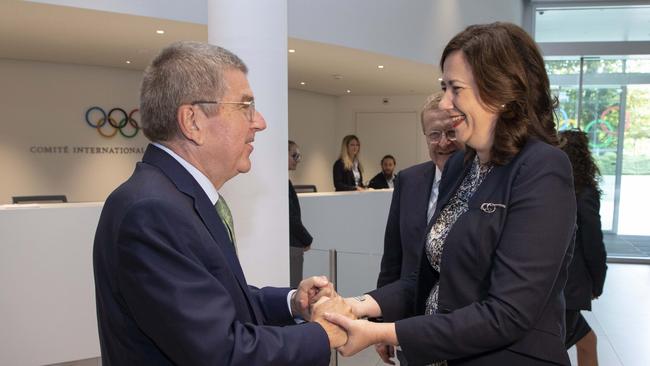
The morning session had been taken up with mostly technical details about the IOC’s expectations of a successful bid and the ongoing process that would be adhered to with the winning country.
Those familiar with the meeting say Ms Palaszczuk was “a bit like a deer in the headlights” with the information overload coming at her so fast and furiously during the first session.
They then broke for lunch, hosted by IOC president Thomas Bach, and it was then over to the Premier to open the batting on why Queensland deserved to be given the opportunity to host the 2032 Olympic Games.
Before the afternoon session, Australian Olympic Committee president John Coates and Star Entertainment Group chairman John O’Neill pulled the Premier aside.
“This is showtime now, Annastacia,’’ Mr O’Neill told her.
“This is where you let them know we’re the real deal.’’
According to four people who were present for the Premier’s pitch, it was “as if the lights came on” and Ms Palaszczuk’s enthusiasm and knowledge shone brightly.
“She performed magnificently,” one of those present said. “It was her finest hour. So good.”
Ms Palaszczuk’s presentation was then followed up by a technical dissertation by Olympics consultant Craig McLatchey and then Mr O’Neill gave a rundown on the benefits for business and tourism and how corporate Australia would support the event.
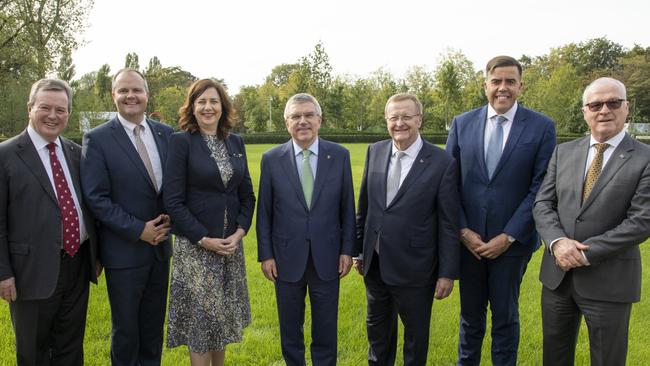
If there had been any hesitancy or trepidation from the IOC on the Brisbane bid, those sentiments quickly disappeared that afternoon.
After the presentation, a beaming Mr Bach fronted the media, declaring he was “very impressed” with what he had witnessed.
The Olympics juggernaut had begun.
Earlier in the day, the warm embrace between the most powerful man in world sport and Ms Palaszczuk had set the scene for what was a pivotal moment in this journey.
“It is such a pleasure to see you again,” was Mr Bach’s opening remark to Ms Palaszczuk.
“It is so nice to see you again, Mr President,” came the reply from the premier.
With that – months before Covid-19, they embraced – the IOC boss giving a typical affectionate European greeting that would remain the hallmark of their personal and professional relationship.
Flanked by senior bureaucrats and Olympic taskforce experts, Ms Palaszczuk delivered Queensland’s pitch for the Games, telling the IOC that the Sunshine State was ready, willing and able to host the greatest show on Earth for two weeks in July, 2032.
She emphasised our sporting culture, our great weather, our organisational capabilities, our stable economy and political system. She spoke of the bipartisan support for the project, with both sides of federal politics – Ted O’Brien from the Liberals and Milton Dick from Labor – being part of the delegation.
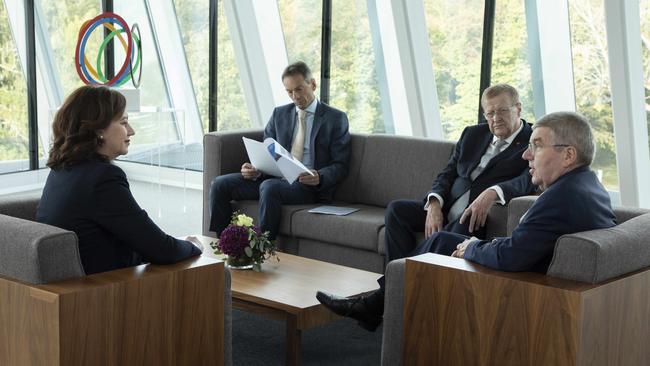
Ms Palaszczuk outlined the South East’s transport infrastructure, including the Cross River Rail project and plans for a second M1.
She spoke passionately of how an Olympics would transform the South East, providing a legacy for future generations.
She also had a 60-minute one-on-one with Mr Bach that demonstrated to the IOC boss that Queensland had the capacity to pull this event off.
Mr Bach is big on gender equity and putting athletes first. He saw in Ms Palaszczuk a young woman, the daughter of Polish immigrants, who had become a successful politician – against all the odds.
He saw a determined, passionate advocate for her home state and they hit it off over prawns and roast beef.
He felt comfortable she would deliver on her promises. Relationships are everything at IOC level.
When Ms Palaszczuk won the last election, one of the first to offer his congratulations was the IOC president.
Make no mistake, Queensland’s bid to host the 2032 Olympics was driven ostensibly by Ms Palaszczuk and Mr Coates – they drove it with a great team around them.
The federal government, under Prime Minister Scott Morrison, never waivered, nor did the Council of SEQ Mayors.
The backing of The Courier Mail was also integral. According to multiple IOC sources, the backing of News Corp – in particular The Courier Mail – under successive editors and senior management was crucial.
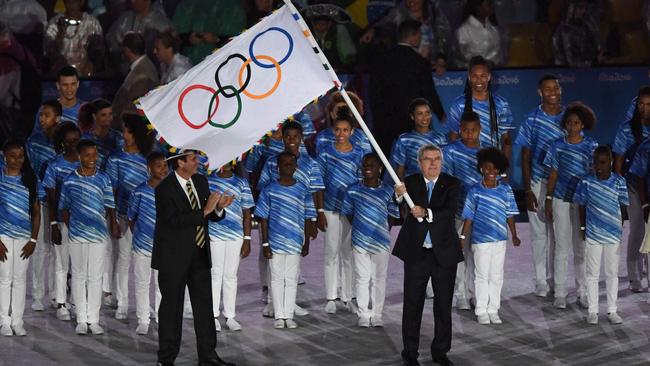
In fact, it was the senior editorial team in 2016-2018 that convinced Ms Palaszczuk that an Olympics was worth chasing, despite her reservations about its popularity, particularly in the regions.
It was the Coates-Palaszczuk relationship with Mr Bach that ultimately sealed the deal.
Mr Bach had told close friends that his experience at the Rio Olympics in 2016 had sown the seeds for the successful Brisbane bid.
Rio was Mr Bach’s first Olympics as president, having taken over from Jacques Rogge in 2013. It is not unreasonable or unkind to suggest that the Rio de Janeiro Olympics was a challenge for the IOC and the Brazilians.
Right up until the opening ceremony, Rio experienced major technical and organisational issues and insiders say Mr Bach had many a sleepless night leading into the Games.
He resolved in Rio that he would never bequeath his successor with the challenges that bedevilled Brazil.
When Queensland emerged as a legitimate candidate for 2032, Mr Bach knew that it was a serious option.
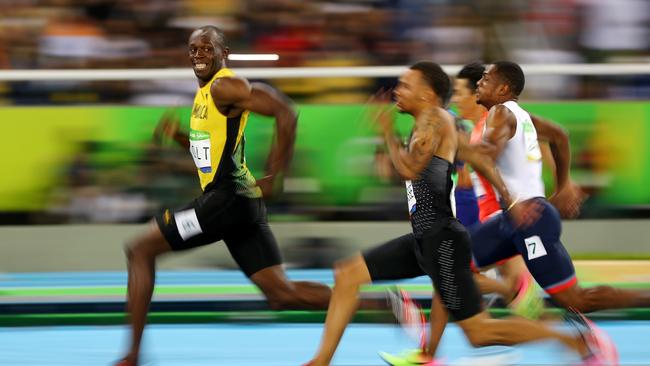
He had been to the Gold Coast for the Sport Accord in 2019 and had been shown facilities used for the 2018 Commonwealth Games.
As a member of the IOC since 1991, Mr Bach had marvelled at the success of the Sydney Olympics and the Aussie love of sport.
As a former champion fencer, he knew of Australia’s rich Olympic heritage and had watched the Melbourne and Rome Olympics as a kid on his black and white TV in Germany.
Mr Bach knew the Olympic brand needed safety, security and modern, progressive countries to host the Games during his tenure, which now expires in 2025.
He saw the Queensland bid as just that. A safe pair of hands in an increasingly uncertain global world.
The IOC also watched closely how Queensland handled the Covid-19 pandemic and our world-leading response did not go unnoticed.
After the Lausanne meeting in September 2019, under the IOC’s new paradigm, where bidding countries did not have to spend a fortune to get the green light, the Queensland offering was quickly elevated to the preferred status.
The past few months has been all about fine-tuning the Queensland bid and ensuring the fiscal and operational benchmarks are met.




